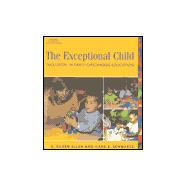
Note: Supplemental materials are not guaranteed with Rental or Used book purchases.
Purchase Benefits
What is included with this book?
| Foreword | vii | ||||
| Preface | ix | ||||
| Acknowledgments | xiii | ||||
| Section I Early Intervention and Public Policy | 1 | (52) | |||
|
2 | (20) | |||
|
3 | (2) | |||
|
5 | (1) | |||
|
6 | (5) | |||
|
11 | (2) | |||
|
13 | (1) | |||
|
14 | (2) | |||
|
16 | (3) | |||
|
19 | (1) | |||
|
20 | (2) | |||
|
22 | (15) | |||
|
23 | (2) | |||
|
25 | (2) | |||
|
27 | (3) | |||
|
30 | (2) | |||
|
32 | (2) | |||
|
34 | (3) | |||
|
37 | (16) | |||
|
38 | (1) | |||
|
39 | (1) | |||
|
40 | (6) | |||
|
46 | (1) | |||
|
46 | (4) | |||
|
50 | (3) | |||
| Section II Likenesses and Differences Among Children | 53 | (84) | |||
|
54 | (13) | |||
|
56 | (3) | |||
|
59 | (2) | |||
|
61 | (3) | |||
|
64 | (3) | |||
|
67 | (18) | |||
|
68 | (6) | |||
|
74 | (1) | |||
|
75 | (6) | |||
|
81 | (4) | |||
|
85 | (17) | |||
|
86 | (6) | |||
|
92 | (6) | |||
|
98 | (4) | |||
|
102 | (19) | |||
|
103 | (6) | |||
|
109 | (7) | |||
|
116 | (1) | |||
|
117 | (4) | |||
|
121 | (16) | |||
|
122 | (1) | |||
|
122 | (2) | |||
|
124 | (6) | |||
|
130 | (1) | |||
|
131 | (2) | |||
|
133 | (1) | |||
|
134 | (3) | |||
| Section III Planning for Inclusion | 137 | (60) | |||
|
138 | (18) | |||
|
139 | (5) | |||
|
144 | (8) | |||
|
152 | (4) | |||
|
156 | (25) | |||
|
157 | (1) | |||
|
158 | (3) | |||
|
161 | (7) | |||
|
168 | (3) | |||
|
171 | (6) | |||
|
177 | (4) | |||
|
181 | (16) | |||
|
182 | (3) | |||
|
185 | (8) | |||
|
193 | (4) | |||
| Section IV Implementing Inclusive Early Childhood Programs | 197 | (137) | |||
|
198 | (16) | |||
|
199 | (2) | |||
|
201 | (7) | |||
|
208 | (2) | |||
|
210 | (1) | |||
|
211 | (3) | |||
|
214 | (17) | |||
|
215 | (1) | |||
|
216 | (1) | |||
|
216 | (5) | |||
|
221 | (2) | |||
|
223 | (4) | |||
|
227 | (1) | |||
|
228 | (3) | |||
|
231 | (18) | |||
|
232 | (1) | |||
|
233 | (1) | |||
|
234 | (11) | |||
|
245 | (1) | |||
|
246 | (3) | |||
|
249 | (17) | |||
|
250 | (1) | |||
|
250 | (1) | |||
|
251 | (5) | |||
|
256 | (3) | |||
|
259 | (2) | |||
|
261 | (2) | |||
|
263 | (3) | |||
|
266 | (19) | |||
|
267 | (1) | |||
|
267 | (1) | |||
|
268 | (1) | |||
|
268 | (11) | |||
|
279 | (2) | |||
|
281 | (4) | |||
|
285 | (15) | |||
|
286 | (4) | |||
|
290 | (7) | |||
|
297 | (3) | |||
|
300 | (16) | |||
|
301 | (12) | |||
|
313 | (3) | |||
|
316 | (18) | |||
|
317 | (1) | |||
|
317 | (8) | |||
|
325 | (5) | |||
|
330 | (1) | |||
|
331 | (3) | |||
| Glossary | 334 | (11) | |||
| Appendix A Selected List of Screening Tools and Assessment Instruments for Use with Infants and Young Children | 345 | (3) | |||
| Appendix B Preschool Profile | 348 | (3) | |||
| Appendix C Sources of Information, Support, and Training Material for Teachers and Parents of Children with Developmental Disabilities | 351 | (3) | |||
| Appendix D On-Line Resources | 354 | (2) | |||
| Appendix E Becoming Aware of Baby and You: Ways to Interact with Your Baby | 356 | (3) | |||
| Index | 359 |
The New copy of this book will include any supplemental materials advertised. Please check the title of the book to determine if it should include any access cards, study guides, lab manuals, CDs, etc.
The Used, Rental and eBook copies of this book are not guaranteed to include any supplemental materials. Typically, only the book itself is included. This is true even if the title states it includes any access cards, study guides, lab manuals, CDs, etc.